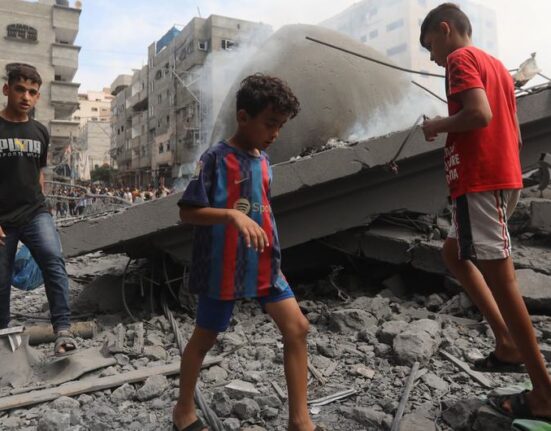Torrents of predawn rain wreaked havoc in the market town of Mokwa, Nigeria. The devastating flooding resulted in the tragic loss of at least 150 lives, and officials fear the death toll may rise further. The Nigerian Hydrological Services Agency is assessing the situation but has not yet disclosed the exact amount of rainfall that poured down on Mokwa after midnight on Thursday.
Mokwa, located more than 180 miles west of Abuja in the state of Niger, witnessed catastrophic scenes as floodwaters engulfed entire neighborhoods. Videos and photos shared on social media showcased homes submerged under brown currents, with rooftops barely visible above the water level. In a desperate attempt to salvage belongings and rescue others, residents waded through waist-deep water.
The northern regions of Nigeria have been grappling with prolonged dry spells exacerbated by climate change. This environmental challenge has been further aggravated by excessive rainfall during the short wet season, leading to devastating floods in various parts of the country. Mokwa serves as a vital trading hub where farmers from northern Nigeria supply beans, onions, and other produce to traders from southern regions.
Alhaji Aliki Musa, a respected community leader from Mokwa local government Area, emphasized the severity of these recurring floods:
“The water is like spiritual water which used to come but it’s seasonal…there’s not much water in Mokwa that will bring that flood.”
The cyclical nature of these calamities underscores their impact on local communities and highlights the urgent need for sustainable solutions to mitigate future disasters.
This recent catastrophe echoes a similar tragedy in September when torrential rains and a dam collapse in Maiduguri led to severe flooding that claimed at least 30 lives and displaced millions. The region’s vulnerability to such natural disasters exacerbates an already dire humanitarian crisis stemming from ongoing conflict with Boko Haram militants based in northeastern Nigeria.
As experts continue to analyze the factors contributing to these recurrent calamities, it becomes increasingly clear that proactive measures are essential to safeguard vulnerable communities against the destructive force of nature. Collaboration between government agencies, relief organizations, and local residents is crucial in developing resilience strategies and effective disaster response mechanisms.









Leave feedback about this